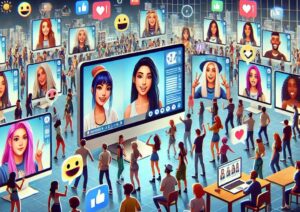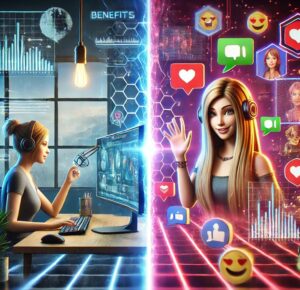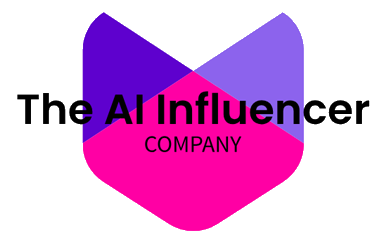Artificial intelligence (AI) has become the hottest trend in marketing. Instead of just relying on human marketers, companies are now utilizing AI tools to analyze data, predict customer behavior, and deliver personalized experiences.
This shift towards AI-powered influencer marketing is happening because of its ability to transform marketing effectiveness.
Let’s explore 10 compelling reasons brands are embracing AI marketing:
AI Can Process Massive Amounts of Data
 One major advantage of AI is its ability to process gigantic datasets far exceeding human capacity. While human marketers are constrained, AI marketing tools can efficiently sift through millions of data points to uncover actionable insights. For example:
One major advantage of AI is its ability to process gigantic datasets far exceeding human capacity. While human marketers are constrained, AI marketing tools can efficiently sift through millions of data points to uncover actionable insights. For example:
- AI can categorize customers based on countless combinations of attributes and behaviors simultaneously, enabling more nuanced personalization at scale.
- By detecting subtle patterns in complex data, AI can reveal non-obvious correlations that point to new opportunities.
- AI empowers hyper-specific targeting of customers using real-time data from numerous sources.
In essence, AI can extract powerful marketing insights from vast troves of big data that would otherwise be missed.
AI Radically Boosts Marketing Efficiency
By automating a tremendous range of repetitive, manually intensive marketing tasks, AI frees up human marketers to focus their time on high-value strategy, planning and innovation. AI assistants can independently handle an enormous volume of repetitive jobs such as:
- Data extraction, cleaning, normalization and structuring for millions of data points.
- Production of marketing assets including collateral, websites, videos, dynamic ads and tailored content at scale.
- Granular customer segmentation, predictive lead scoring, list management and personalized email sequencing at a 1:1 level.
- Extensive automated keyword research, SEO audits, metadata optimization and content gap analysis.
- 24/7 social media listening, community management and engagement monitoring across countless channels and touchpoints.
According to an Accenture study, organizations who use AI in marketing experience an average boost in return on investment (ROI) of up to 30%. This monumental efficiency boost allows marketing teams to accomplish far more with reduced manual effort.
AI Powers Predictive Marketing
Unlike human marketers who rely largely on intuition and past experience, AI models can rapidly analyze astronomical amounts of data to accurately forecast future outcomes and trends. This unlocks game-changing predictive marketing capabilities such as:
- Predictive lead scoring – AI assigns a refined probability score to each lead based on thousands of historical data points to enable sales teams to prioritize high-potential opportunities first.
- Customer lifetime value modeling – AI estimates the future revenue expected from each customer to inform superior investment decisions.
- Real-time propensity modeling – AI identifies the customers statistically most likely to churn at any given moment to trigger proactive retention campaigns.
- AI-powered campaign simulations – AI runs hundreds of thousands of simulated campaigns to predict the highest-converting creative, offers, and strategies before deploying initiatives.
Marketers can make optimal decisions aligned with data-driven forecasts to maximize results with these predictive insights.
AI Drives Dramatically Higher ROI
AI provides substantially higher return on investment (ROI) by optimizing every facet of marketing including:
- Micro-targeted segmentation at an enormous scale to eliminate media waste and ensure ads reach only statistically probable converters.
- Continuous multi-armed bandit testing and budget shifting across campaigns, platforms, keywords and channels based on real time data.
- Programmatic bid adjustments in real time to acquire customers at the mathematically optimal cost point.
Based on BrightBid, 79% of top marketing executives claim increased ROI utilizing AI tools. This means that using AI has boosted the growth for businesses.
AI Creates Relevant Omnichannel Experiences
AI marketing tools can orchestrate continuously optimized omnichannel experiences. Marketers can apply sophisticated machine learning algorithms to analyze each customer’s interests, behaviors, and preferences.
This personalization is critical for building loyal brand relationships, including:
- Individualized content recommendations – AI suggests relevant blogs, videos, special offers and products tailored to each person across channels.
- Context-aware engagement – AI adjusts messaging and offers based on factors like time of day, location and activity in real time.
- Hyper-relevant cross-channel advertising – AI serves dynamic ads optimized for each user based on current search intents, webpage activity and historical data.
According to a report, 69% of people say they value personalization. So long as AI responses are based on data, people will feel valued as they experience services that are tailored and directed to them.
AI Continuously Optimizes and Improves
 While human marketers work in linear campaign cycles, AI marketing systems operate in a continuous rapid improvement loop.
While human marketers work in linear campaign cycles, AI marketing systems operate in a continuous rapid improvement loop.
They constantly A/B test content variations, track performance data, run multilayered experiments and simulations, and refine omnichannel strategies in real-time. Key applications include:
- Multivariate testing at scale – AI algorithms like genetic programming automatically test endless combinations of variables across campaigns to optimize performance.
- Exponential machine learning – The more data AI marketing tools absorb, the more intelligent they become over time as algorithms iteratively update.
- Always-on performance tracking – AI monitors millions of granular data points 24/7 to detect micro-opportunities and issues in real time.
This continuous optimization allows AI to consistently outperform static marketing efforts.
AI Mitigates Unconscious Biases
Unlike humans who inevitably have conscious and unconscious biases, AI is impartial in profiling customers and determining actions. For brands, this promotes:
- Fairer targeting – AI focuses recommendations solely based on behavioral signals, not flawed human assumptions.
- Broader appeal – AI expands audience reach by eliminating segmentation biases.
- Respectful interactions – AI chatbots consistently interact with sensitivity, dignity and emotional intelligence.
By mitigating human biases, AI enables brands to engage everyone respectfully and avoid missteps.
AI Works 24/7/365 Without Fatigue
From responding to late-night customer inquiries to optimizing wee-hour campaigns, AI marketing tools operate 24/7/365 without tiring. Benefits include:
- Total coverage – AI chatbots provide seamless messaging across global time zones.
- No downtime – AI achieves 100% uptime with no dips on nights, weekends or holidays.
- Limitless scale – AI handles enormous workloads and traffic spikes without additional staff.
Per Inc. Founders House, 51% of individuals believe that a business must be open 24 hours a day, seven days a week to match their modern expectations of ease and accessibility.
AI Augments Human Talent
Some fear AI will replace human jobs, but the reality is AI will augment human skills while removing repetitive work. Deloitte predicts that widespread AI adoption will “free up” 30% of employees’ time within five to seven years.
- AI handles rote tasks so marketers can focus on innovation and strategy.
- Humans provide creativity, empathy and vision while machines excel at analysis.
- Together, they achieve better results than either could alone.
Gartner predicts that humans, AI, and robots will represent the new workforce in 2028.
AI is the Inevitable Future of Marketing
Marketing becomes more competitive and complex as AI will become indispensable. Marketers should know that staying relevant to the industry means including and considering the following:
- Surging data complexity – complex data will grow and AI can glean insights faster than humans.
- Customer experience imperatives – AI is a huge help as it is available 24/7 so integrating AI is mandatory to stay on the game. Although AI cannot beat humans when it comes to real empathy, AI can initially get basic info which is a repetitive task. It will give human customer support more time to focus on things AI cannot address.
- New capabilities – AI innovations like generative content and autonomous optimization will propel marketing forward. To capitalize, brands must adopt AI now. Not only because it is faster but AI can also store and analyze huge data. These are some of the tasks that humans would take time to finish.
Conclusion
The AI marketing revolution is upon us. As we have explored, artificial intelligence provides transformative capabilities that allow brands to engage customers in groundbreaking new ways.
Rather than replacing human marketers, AI empowers them to focus on creativity, strategy and emotional connection. The winning formula is combining the strengths of machines and marketers.
Brands that fail to adopt AI risk falling irrevocably behind the competition. However, those who strategically implement AI will gain an unassailable competitive advantage today and in the years ahead. The marketing AI tipping point is here.
The brands that boldly lead this revolution will own the future, while laggards will fade into oblivion.
One thing is clear – AI is no longer optional, it is mandatory. The time to fully commit to AI-powered marketing is right now. Because in an era of exploding data and soaring customer expectations, AI is the new indispensable. The future of marketing has arrived, and it is artificial intelligence.




